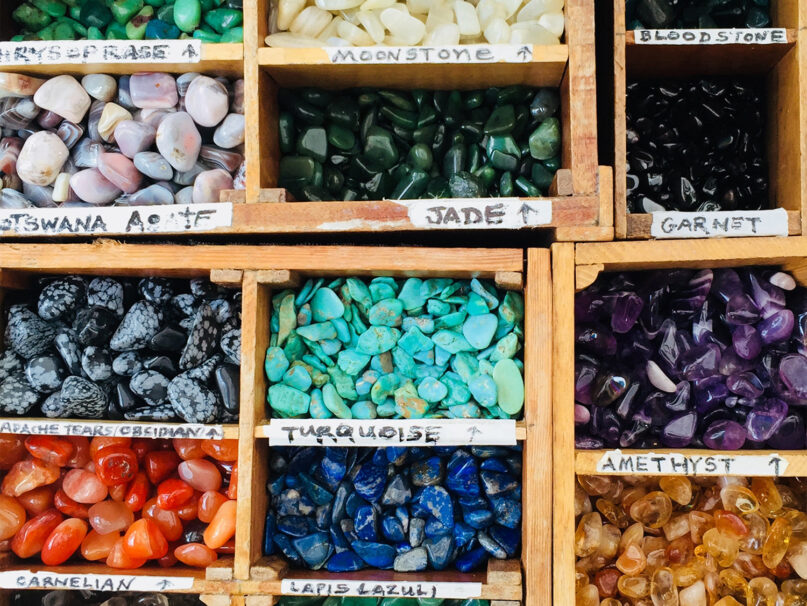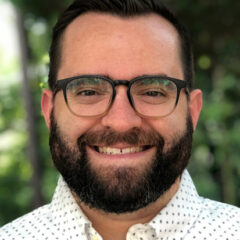‘Rosary beads? Yes. But crystals, no.’: Catholic school counselor loses her job
An employee who invited three Wiccan high priestesses to speak to marketing students did not believe that the crystals they handed out nor their religion would cause a stir.

(RNS) — For two marketing classes taught at North Catholic High School in the Diocese of Pittsburgh, a career and college counselor at the school invited three owners of a local store to talk about how they run their small business. As part of their visit in December, the store owners offered each student a small crystal.
That’s because the business, Elemental Magick, sells books, jewelry, candles and other items used in various metaphysical practices. The three store owners, married couple Tabitha and Tamara Latshaw and their sister-in-law Kari Latshaw, are all Wiccan high priestesses.
“We sell crystals,” said Tabitha Latshaw in a video statement posted to Facebook. “If we sold gum, we would have handed out a pack of gum.”
But after some students complained to North Catholic administrators, according to reports, the counselor, who has not been identified publicly, was questioned, then, in early January, asked to resign.
In an interview with KDKA-TV, Michelle Peduto, a diocesan school administrator, explained that educators at diocesan schools are required to sign a statement saying that their instruction will align with Catholic teachings. Both the visit and the crystals were not a “good fit,” she said.
“It is because, as we know, our faith is in Jesus Christ and not in objects necessarily,” Peduto said in a separate interview with KDKA. “Rosary beads? Yes. But crystals, no.”
North Catholic, founded in 1939 as a boys school and staffed traditionally by the Marian order, is an anchor of Catholic life in Pittsburgh. Alumni include former CIA Director Michael Hayden and the late owner of the Pittsburgh Steelers, Dan Rooney.
Formerly known as Cardinal Wuerl North Catholic High School, after the former bishop and archbishop of Washington, D.C., the school removed the cardinal’s name in 2018 at his request after he was criticized for his handling of sexual abuse cases there.
According to the KDKA-TV report, letters were sent home after the store owners’ appearance in the marketing classes. The letters asked families to “dispose of the crystals” and to cleanse their home by saying a prayer to St. Michael the archangel. The Diocese of Pittsburgh reportedly labeled the employee’s actions “inappropriate” and, in a letter to the former employee, “egregious.”

Photo by Dan Farrell/Unsplash/Creative Commons
The Latshaws did not know of their friend’s departure from North Catholic until last week when a reporter asked for their reaction. After learning the news, the store owners have used the situation to demonstrate the popularity of crystals across various religions and in society at large.
A recent survey by Springtide Research Institute shows that 44% of Gen Z use crystals and herbs for spiritual connection or entertainment.
“Crystals are everywhere and are exclusive to no religion, including Wicca,” said Tabitha Latshaw in the Facebook statement, pointing out that in the jewelry industry, crystals are more commonly known as semiprecious gemstones.
The store owners labeled their weekly Sunday crystal sale #Godcreatedthis. “You don’t have to be a witch to use crystals,” Latshaw said in a video statement. “We have people of all walks of faith come in here.”
The Latshaws say they weren’t there to talk about witchcraft or religion of any kind. “We went to North Catholic High School to discuss being entrepreneurs,” Tabitha Latshaw told Religion News Service.
She told KDKA-TV: “God made these. They come from the earth. That’s all I can say.”
The former school employee told the local reporter that she did not believe that the crystals or the owners’ religion would cause a stir. In hindsight, she recognized she should have thought the visit through more carefully, but she was surprised that the situation was not used as an “opportunity for me to grow and develop as a professional and as a Catholic.”
For Gen Z, crystals embed spirituality in the planet
They often seem to occupy a place once held by traditional religious beliefs.

(RNS) — Leanna Greenaway used to keep her practices with crystals and herbs to herself. “Back when I was in my 20s, I practiced in a solitary fashion because it was still very much a taboo subject,” she explained.
Now Greenaway, the author of the popular 2019 book, “The Crystal Witch: The Magickal Way to Calm and Heal the Body, Mind, and Spirit,” said young people are reaching out to her in droves. “They’re asking questions about the magical properties of crystals and herbs. This wave of young people were born with a higher consciousness. They’re more focused on the well-being of the planet and more sensitive to the earth’s vibrations,” she said.
Greenaway is backed up by recent data from Springtide Research Institute, which surveys tens of thousands of young people ages 13-25 each year about their spirituality. The 2022 study found that 44% engage with crystals or herbs as a spiritual exercise, with one in five (21%) saying they do so on at least a weekly basis.
The people of Gen Z hear about these practices via a slew of independent spiritual teachers who appear on popular social media apps such as TikTok and Instagram, on which 75% of young people said they spend at least three hours a day, according to Springtide’s survey. They also hear about them from an increasing number of celebrities they admire.
Crystals and herbs have been associated throughout history with the supernatural and have long been thought to provide humans with healing, vitality and tranquility. Bright crystals like amethyst and rose quartz are thought to aid in creating relationships, while darker stones such as black tourmaline are said to absorb negative energies and toxicity.
Popular herbs such as rosemary are thought to provide protection, while Panax Ginseng “quiets the spirit, particularly (the soul), helps stop palpitations with anxiety and, where necessary, opens the heart and strengthens the resolve,” according to holistic healer Maura Farragher.
For some young people, experimenting with crystals and herbs is akin to a hobby. As one writer put it in 2019, “the route I’ve taken with my personal collection is something closer to casual curation than prescription.” For others, they meet a spiritual need to feel at home in the universe and connected to the “energies” at work around them.
They often seem to fill a gap where traditional religious beliefs, practices and community might have been, as attendance rates at religious services among Gen Z continue to dwindle.
Blake Newborn, a 22-year-old who lives in Pennsylvania, used to go to church, but now he prefers to find spiritual solace in crystals, tarot and the zodiac. “I would prefer these any day over a religious institution. Sometimes I don’t feel like they’re welcoming to certain groups of people,” he adds. Though Newborn identifies as an atheist, he acknowledges the universe as a higher power who accepts him. “My identities clash with the Bible, but not the universe. The universe created you and accepts you for who you are.”
The last time Newborn went to church, he said, “I didn’t feel welcome. There was something inside of me that was like, ‘You don’t really fit in here.’ It may have been that the energies were off with mine.”
When I talked to Newborn, he was wearing a crystal bracelet with a tiger’s eye stone that he believes provides strength. Newborn’s astrology sign is a Leo, and his Zodiac sign is a tiger, bringing the choice of bracelet full-circle. He also had a salt lamp to cleanse the energy of his bedroom, combat negativity, give him a sense of focus and promote calm.
Newborn’s use of crystals has brought him closer to his aunt, who, though she actively attends church, started practicing with crystals as well. “She feels more connected to that spirituality, and she will talk about it with me, and we will really vibe with one another,” Newborn said.
As Greenaway’s experience attests, New Age spiritual practices were once isolating and individualistic, but with growing numbers of young people engaging in these practices, community has formed around them of late. “Literally everyone I know looks at their Zodiac signs, goes to Tarot card readings and has some type of crystal,” said Newborn, adding, “only a couple of people I know go to church.”
Some demographics within Gen Z are more attuned to these “New Age” practices than others. Young Black Americans (54%) are more likely to try them than American Indians (49%), Latinos (43%), whites (42%) or Asians (35%). Non-binary young people (58%) are more likely to be involved with crystals and herbs than female-identifying (44%) and male-identifying (42%) young people, and non-straight (53%) more than straight young people (39%).
Among faith groups, crystals and herbs are most popular among Orthodox Christians (73%), by those who don’t define their religion by traditional categories (65%) and by Latter-day Saints (64%).
A special focus of Springtide’s 2022 study was how spirituality correlates with flourishing for Gen Z in several areas of life. While 17% of all young people say they’re flourishing a lot in their faith, this number increases for young people who engage spiritually with crystals and herbs weekly (21%) or daily (24%). Similarly, while 24% of all young people say they’re flourishing a lot in their mental and emotional health, this number increases for young people who engage with crystals or herbs weekly (28%) or daily (30%).

Kevin Singer. Photo courtesy of Springtide
For older generations, the use of these practices may seem strange, and there may be a learning curve. But curiosity about these practices may make the difference in gaining their trust at a formative time in their development.
(Kevin Singer (@kevinsinger0) is head of media and public relations at Springtide Research Institute. The views expressed in this commentary do not necessarily reflect those of Religion News Service.)
No comments:
Post a Comment